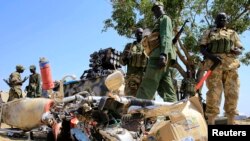JUBA —
Scores of South Sudanese soldiers wounded in fighting between pro- and anti-government forces blocked a major road in Juba Monday to protest what they said were several months of unpaid wages.
The wounded soldiers - some walking on crutches, others missing limbs or with bandaged wounds - stormed out of a military hospital at the Giada barracks near Juba University, blocked traffic and threw stones at passing motorists as they demanded that their wages be paid immediately.
The protesting soldiers disrupted traffic for several hours along the Customs Market to Malakia road but military police surrounded them to prevent them reaching other parts of the city.
None of the soldiers was willing to be interviewed but, in comments made to VOA, they accused the government of neglecting them.
Army spokesman Philip Aguer admitted that the wounded soldiers have not been paid in months. But he blamed the delays on the fact that the government has had trouble finding the soldiers to give them their monthly payments.
"If somebody is wounded in Upper Nile and is brought here, there is no automatic system where you just transfer the salary to the hospital or to the unit here in general headquarters. We don’t have an electronic system that is very fast,” Aguer said.
Aguer said military authorities are working to see that all soldiers are paid promptly, but did not specify when the wounded soldiers might expect to receive their back-pay.
Dozens of soldiers were killed at the Giada barracks early this month in another clash over pay. These are the same barracks where the conflict began last December, triggering months of conflict that has claimed thousands of lives and displaced some 900,000 people around the young country.
The wounded soldiers - some walking on crutches, others missing limbs or with bandaged wounds - stormed out of a military hospital at the Giada barracks near Juba University, blocked traffic and threw stones at passing motorists as they demanded that their wages be paid immediately.
The protesting soldiers disrupted traffic for several hours along the Customs Market to Malakia road but military police surrounded them to prevent them reaching other parts of the city.
None of the soldiers was willing to be interviewed but, in comments made to VOA, they accused the government of neglecting them.
Army spokesman Philip Aguer admitted that the wounded soldiers have not been paid in months. But he blamed the delays on the fact that the government has had trouble finding the soldiers to give them their monthly payments.
"If somebody is wounded in Upper Nile and is brought here, there is no automatic system where you just transfer the salary to the hospital or to the unit here in general headquarters. We don’t have an electronic system that is very fast,” Aguer said.
Aguer said military authorities are working to see that all soldiers are paid promptly, but did not specify when the wounded soldiers might expect to receive their back-pay.
Dozens of soldiers were killed at the Giada barracks early this month in another clash over pay. These are the same barracks where the conflict began last December, triggering months of conflict that has claimed thousands of lives and displaced some 900,000 people around the young country.




